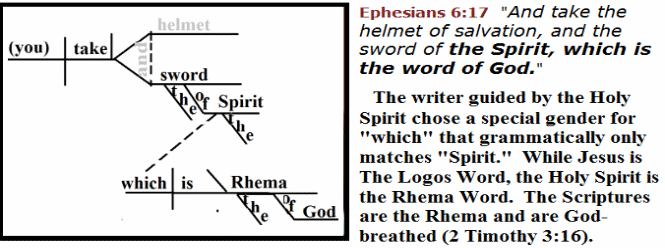

God the Father, just as He spoke in the past in the OT through His prophets, continues to speak to His people today through the New Testament by using His Words spoken to Jesus, who then spoke to His Apostles, who wrote them down, which are the books of the New Testament (Heb 1:1-3 Luke 10:16 John 13:20, 17:17-20). The word ‘logos’ cannot be interpreted as only the written Word (ex Eph 6:17 Heb 6:5). The word of faith is ‘preached’ and not ‘written.’ Whether the Bible uses the word ‘rhema’ of God, or ‘logos’ of God, it still points to that which is spoken in the majority of cases. The ‘rhema’ words of Peter were seen as a ‘logos.’ĭuring the early years of preaching the gospel, it was not written down yet, but the gospel is just as well contained in the OT as it is in the NT. The ‘logos’ word is also equated with the ‘rhema’ word that was delivered on the day of Pentecost ( Acts 10:44). The word ‘rhema’ is also used of the gospel of Christ being preached, and not the written word that is used to sanctify and cleanse, or the spoken word (Ro 10:8, 17 Eph 5:26 1 Pet 1:25). Although the prophets ‘spoke’ words from God, they were written to the people (1 Pet 1:25 2 Pe 3:2,5 Heb 12:19,11:3 Jude 1:17).

The word ‘rhema’ can be seen referring to what was written. Both ‘rhema’ and ‘logos’ are meant to be synonyms and are equated with each other (2 Pet 3:5). Jesus is the 'logos' who spoke the ‘logos’ and all that exists came into existence ( John 1:1-3). The Bible often uses the Greek word ‘graphe’ to refer to the written Word of God and ‘logos’ to refer to that which Jesus had spoken ( Matt 21:42 22:29 John 2:22, 5:39, 14:23-24, 17:6,14 Acts 17:11 18:24 Rom 1:2). The ‘logos is also ‘spoken’ by angels (Heb 2:2, 12:19) and also refers directly to Jesus ( John 1:1,14). It is used regarding the supernatural gifts of prophecy, wisdom, knowledge, and tongues (1 Cor 12:8, 14:9). 'Logos' also refers to the gospel as preached by the Apostles, and not to all the Scriptures ( Acts 4:4). The Greek word ‘logos’ refers to a word, decree, the act of speaking, teaching, reason, account first sense of collection, counting, conversation expression of thought, a complete statement description, thoughts expressed in words, relates to speaking and thinking, a divine declaration recorded in the Old Testament (OT) systematic and formal treatment of a subject, the content of what is preached' pertaining to matter. There are 218 times when the word "logos" occurs and it is translated simply as "word." ”Rhema” is translated 56 times as "word." The word "logos" occurs 50 times and is translated "saying." Nine times "rhema" is also translated as "saying." The words "logos" and "rhema" are equally associated with "word" and "saying." "Rhema" is a saying that could be in a written form, so many "rhema's" put together could constitute a "logos". The word "rhema" occurs 70 times in the NT. The word "logos" occurs 330 times in the NT. The actual difference between the words is simply a matter of writing style and expression. The words "rhema" and "logos" overlap in their definitions. The Septuagint translates both ‘logos’ and ‘rhema’ from the Hebrew word ‘dabar,’ which means ‘that which is uttered in speech, or writing, discourse, the subject matter of speech a minimal unit of discourse, a single word, a focus on the content of the communication. A simple word study of the original Greek language used in the New Testament (NT) quickly reveals that there is no major difference between the words ‘rhema’ and ‘logos.’ This belief is being used to validate and justify teaching that is contrary to traditional orthodox Christianity.

This has caused the belief that a ‘spoken’ word through prophecy, dreams, visions, or a Word of Knowledge is ‘fresh revelation’ that is greater than, and supersedes, the written Word, the Bible. There is a teaching in the church today that the Greek word ‘rhema’ is the spoken Word 'from' God to people today, and the Greek word ‘logos’ is God's written Word as we have in the Bible.


 0 kommentar(er)
0 kommentar(er)
